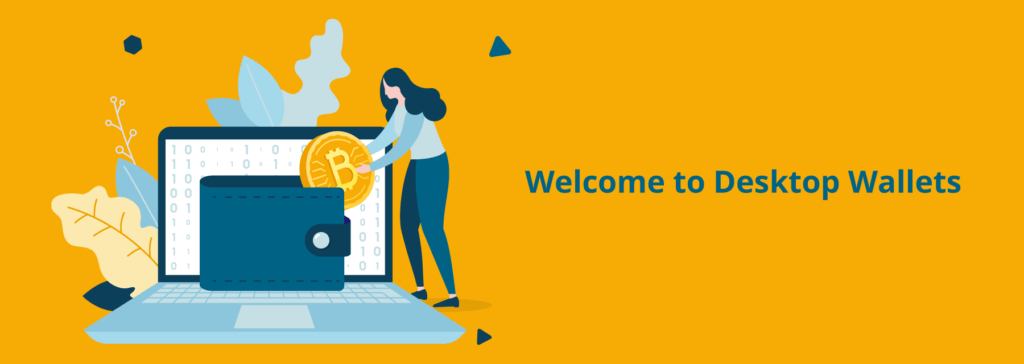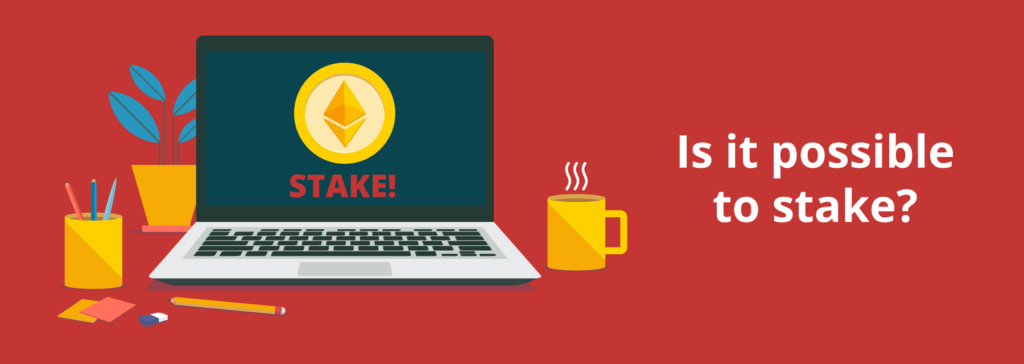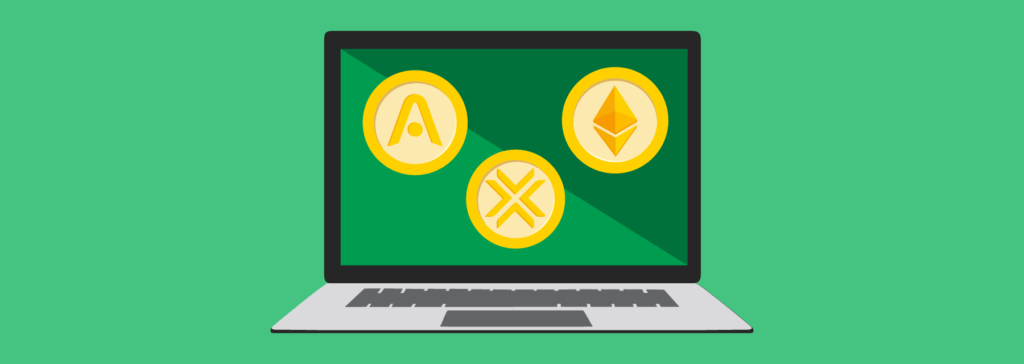A complete guide to Desktop wallets
Crypto wallets are essential if you’re going to buy crypto or use crypto.
But, there are lots of different types of wallets out there.
So, in this guide we’re going to take a look at desktop wallets to see what all the fuss is about.
Are desktop wallets good?
Are desktop wallets safe to use?
Let’s find out!
What are Desktop wallets?

Desktop wallets are computer programs that run on your PC or laptop device.
They store and manage your private keys, just like any other wallet would, but they often have a few more features than you’ll find in other types of wallets.
The best desktop wallets are available on Mac, Windows, and Linux operating systems, but you can find them available for other systems.
Each desktop wallet has a different set of features and functions, which can make picking the right wallet tricky.
But, thanks to your machine having more power than a hardware wallet or a mobile wallet, these desktop wallets can do so much.
For example, all cryptocurrencies will have a core wallet available as a desktop wallet.
These come with more features and allow you to run a full node to validate transactions within your wallet – how cool is that.
Full node wallets take up more space on your computer and they also require more time to sync when the device has been offline.
This makes them less practical for the average user, but if you’re a crypto power user, they’re handy.
Desktop wallets run just like any other app or program on your computer, so you don’t need to worry about using this type of wallet if you’re not tech savvy.
If you’re able to buy crypto and remove it from an exchange, then you are skilled enough to use a desktop wallet.
You don’t need to use all the fancy features and make use of all their bells and whistles if you don’t wish.
So don’t get freaked out that there are lots of additional features and buttons that make no sense.
You can use desktop wallets just like any other wallet to send and receive crypto.
You don’t have to become a validator and sync the entire blockchain, if you don’t want to.
Desktop wallets are more secure than a mobile wallet, but are less secure than a hardware wallet.
This makes them good for power users that want flexibility and more complex transactions, but aren’t looking to hold their fortunes.
That being said, you can use an air gapped PC which would be more secure than a hardware wallet.
How do Desktop wallets work?

Desktop wallets can be rather unique in the sense that they can require you to download an entire copy of the blockchain network.
These are known as full node wallets and are a bit of a hassle.
If you take Bitcoin, for example, the entire blockchain is well over 300GB.
This means that you’ll spend a few days syncing the blockchain and downloading all the data, if your network speed is average.
Slower networks will take weeks to sync the entire blockchain, and if you lose connection mid-way, you’ve got to start all over again.
The only advantage of full node wallets is that you can validate and verify your own transactions.
This isn’t really useful for average crypto users and is a feature that’s aimed at crypto pros and people that are a bit more paranoid about their transactions.
Other than this feature of desktop wallets, they work the same as all other types of wallets.
Once you create a new wallet from within a desktop wallet app, the wallet will generate a new crypto address and store the keys associated with it.
You then use the wallet to interact with the crypto stores in your address on the blockchain.
This means that none of the crypto actually lives on your computer, instead living on the blockchain.
Your desktop wallet only controls the keys that allow you to move the crypto in your address.
Do all Desktop wallets support all cryptos?

Desktop wallets have come a long way since the early days, and we’re seeing more simplified payment verification (SPV) wallets appear on the market.
These SPV wallets allow you to store and use keys to multiple blockchains.
As a result, you can hold multiple cryptocurrencies in a single desktop wallet.
Full node wallets are single blockchain, meaning that they’ll only work with the cryptocurrency from that blockchain.
For example, the Bitcoin Core wallet will only allow you to send, receive and hold Bitcoin, whereas the Atomic SPV wallet will allow you to send, receive and hold a wide range of cryptocurrencies.
Imagine if you had to download the entire blockchain for every cryptocurrency that you wanted to use.
This would be a nightmare and is the reason why we don’t see multi-chain full node wallets.
Now, this doesn’t completely answer the question.
You can have single chain SPV wallets as well, they’re lightweight wallets that are more convenient for the average user.
But, there are a few SPV wallets that support multiple currencies, such as Atomic and Exodus.
You can opt for a browser extension wallet such as MetaMask which is arguably one of the better wallets that you can install on your computer.
MetaMask supports a wide range of cryptocurrencies, so if you want something a little less secure than Atomic or Exodus, but is still multi-chain, then it’s a good option.
Can I stake from a Desktop wallet?

Staking is a massive part of the crypto ecosystem, and it’s the backbone of many cryptocurrencies.
Proof-of-Stake (PoS) cryptocurrencies require you to stake your coins in order to achieve consensus.
So, for these cryptocurrencies you’ll want to get yourself a wallet that allows you to stake.
Fortunately, desktop wallets are here to save the day.
In fact, desktop wallets are the preferred wallets for use with staking.
Owing to the fact that they’re more secure than mobile wallets and more accessible than a hardware wallet, it’s quick, easy and convenient to stake with a desktop wallet.
Now, obviously you can’t stake with Bitcoin, so you shouldn’t expect Bitcoin desktop wallets such as Bitcoin Core or Electrum to support staking.
Multi-chain wallets such as Atomic and Exodus support staking and they’ve made it incredibly simple to do so.
If your computer is connected to the internet, then it’s still hot staking, but it’s more secure than using a mobile wallet or exchange to do so.
If you’re using an air-gapped computer, then it’s known as cold staking.
In the case of these 2 wallets, you can stake your crypto within a couple of minutes and start earning rewards.
Can my Desktop wallet get hacked?

If your computer is connected to the internet, it can get hacked.
Technology is surprisingly easy to hack these days, and hackers are becoming smarter as well.
This means that you need to be on top of your game if you’re going to keep your crypto safe.
But, if you’re using your desktop wallet on an air-gapped computer, then it’s much safer.
If you’ve got malware or spyware on your computer, then hackers can easily compromise your crypto wallet and transfer out all of your funds.
They can also inject codes that change how your paste bin works.
When you’re passing in a crypto address, it will automatically change it to the hacker’s wallet.
So, if you don’t check, you won’t notice and can lose your crypto that way as well.
It’s unwise to keep large amounts of crypto on a desktop wallet simply due to the sheer number of vulnerabilities a computer has.
Hackers have an abundance of attack vectors available to them when you’re using a desktop wallet that’s connected to the internet.
When possible, you should look at using a desktop wallet that’s totally air-gapped, or just use a desktop wallet for storing small amounts of crypto.
That being said, these types of wallets are still more secure than an exchange.
You can opt to enable 2-factor authentication (2FA) on many SPV wallets, which is a good extra step.
But, if you also have the desktop 2FA app, the hacker can easily open that app up remotely and copy in the codes.
While desktop wallets are “safer” than mobile wallets, there are still an alarming number of attack vectors that make it incredibly dangerous.
What is the best Desktop wallet?

By now, you likely just want get down to business and download a desktop wallet.
There are quite a few to choose from and they each have their own perks.
As each cryptocurrency has its own official wallet, such as Bitcoin Core, this list of best desktop wallets could go on forever.
So, we’ll bunch them into one and call it official wallets.
But, remember that not all official wallets will have all the features as some blockchains don’t support them.
| Rank | Brand | Multi-chain | Supports Staking |
|---|---|---|---|
| 1 | Exodus | Yes | Yes |
| 2 | Atomic | Yes | Yes |
| 3 | Electrum | No | No |
| 4 | Yeti Cold | No | No |
| 5 | Official Wallets | No | PoS Chains Only |
Exodus and Atomic are fairly similar in terms of quality and experience.
They’re the standout duo in the desktop wallet department and should be your first port of call.
They both work on all major operating systems and give you access to staking and multi-crypto wallets.
You can secure them further with 2-factor authentication if you wish to add it.
If you’re after a Bitcoin wallet, Electrum is fantastic in terms of features, plus it’s open source.
This keeps you more secure from rogue developers, but it also means that there are scammers out there posting clones of the wallet code.
This has caught out quite a few crypto hodlers over the years and continues to be an issue today.
Yeti Cold is by far the most secure Bitcoin wallet on the market, and it comes in 3 different configurations.
Tier 3 is the most secure and requires a fair amount of work to set up and get ready.
But, once you go through that process, your Bitcoin will be the most secure Bitcoin in the world.
Finally, we come to official wallets.
These are the wallets produced by the blockchain projects.
If you’re after the authentic experience, then these wallets are great choices.
However, keep in mind that if you’re going to opt for the full node versions, then you’ll need a ton of hard drive space and a lot of bandwidth.
There are SPV versions of most official wallets and those are a good choice if you wish to head down this path.
But, the fact that these wallets are not multi-blockchain is a major drawback as you’ll need a dozen or so wallets to manage your crypto portfolio.
Desktop wallets have their moments

Desktop wallets can be fantastic if you’re security focused and are willing to put in the effort.
Due to inherent vulnerabilities with technology, desktop wallets are not very secure out of the box.
You still need to be sensible and follow security best practices for your crypto to remain safe.
But, if you put in the work to keep your computer air-gapped, you can have the most secure crypto wallet around.
This will also allow you to cold stake more securely as well, especially when compared to using a hardware wallet.
Plus, many people prefer the interface that a desktop wallet gives them over a hardware wallet.
If you’re looking for a good all-round desktop wallet, Atomic and Exodus are the best in class.
Frequently Asked Questions (FAQ)
A reputable desktop wallet is only as safe as the machine on which it is installed - if your computer becomes infected with a virus, your wallet could be compromised.
This risk is magnified because computers are almost always connected to the internet. It is also easy to download a fake desktop wallet if you’re not careful.